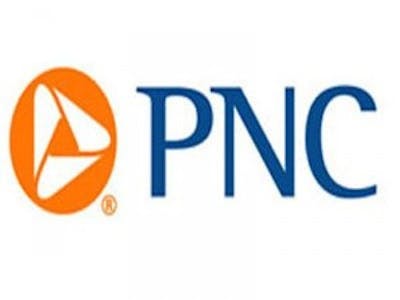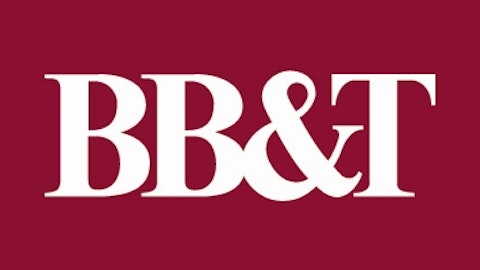A company’s strategic plan (and ability to execute that plan) is critical to the success of the business and thus its stock. One big bank has its eyes set on the following goals.
1). Drive growth in new and underpenetrated markets
2). Increase its wealth and investment business
3). Redefine the retail banking model
4). Build a better-integrated, stronger mortgage business
5). Continue to maintain diligent expense management
That bank is PNC Financial Services (NYSE:PNC). CEO Bill Demchak recently presented these goals as his main priorities.
Expanding footprint
PNC Financial Services (NYSE:PNC) has been transformed in the last five years. It’s made major acquisitions of Cleveland- based National City Bank, which had a significant presence in the Midwest, and RBC Bank (the U.S. division of Royal Bank of Canada), which held a major stronghold, somewhat surprisingly, in the Southeast.

These deal were focused on retail operations, and PNC Financial Services (NYSE:PNC) has seen strong growth in its retail-banking checking accounts, which were up almost 4% over the last year. In addition, the bank has dramatically expanded its presence in the Southeast: Its average loans there have climbed 10%, and total customers have risen 6%. Clearly, the business is growing in places in which it is focusing.
Wealth and investment management
Demchak stated: “Wealth is an area where we have significant opportunity to drive new fee income as well. For a lot of years, our wealth and investment businesses were not priorities for the firm as a whole.” And we have certainly seen that come true through PNC Financial Services (NYSE:PNC)’s most recent earnings release.
While its amount of client assets managed has stayed relatively flat, growing 4% on average each year since 2010, PNC has seen fees and other related income in its Asset Management Group grow 12% in the last year alone.
Although the earnings of PNC Financial Services (NYSE:PNC)’s Asset Management group have actually remained relatively flat, Demchak attributed this apparent lackluster performance to “investments in the business.” In fact, sales that resulted in “primary client acquisitions” (people who could generate $10,000 in revenue or more per year for PNC) were up 36% in the first six months of 2013. Investments in this business may take a few quarters to show in the income statement, but growing relationships like these are almost always a good thing.
Redefining retail banking
As the conversation shifted from asset management to retail banking, Demchak noted that “given the changes in the operating environment, banking in the future has got to be very different from banking in the past.” He discussed how PNC is slowly phasing out its free checking accounts — with the hope that customers will have the “service fees waived, provided they meet certain relationship criteria.”
PNC has also watched its customers shift to more cost-efficient means of interacting with the bank. Their deposits at non-branch locations — via ATMs and mobile phones — increased to 23% of total deposits in the first six months of this year, up 50% from the 14% of deposits they represented during the same time last year. In addition, PNC has seen its active online banking customers grow 8% year over year, to almost 65% of its total checking accounts. By comparison, Bank of America Corp (NYSE:BAC) has seen its online banking customers actually fall year over year.
Expanding the mortgage business
The next key point Demchak noted was the residential mortgage business, calling mortgages the “single most financially important transaction that the vast majority of our retail clients are ever going to entertain during the course of their life.” He noted that thanks to PNC’s Seamless Delivery program, its mortgage applications close at 40 days versus the industry average of 53 days. PNC seems like it’s trying to win customers’ loyalty by providing them with superior service.
While many banks have begun to shy away from mortgages in the face of rising rates, PNC actually saw its originations of mortgages grow 31% in the second quarter of this year, while market leader Wells Fargo & Co (NYSE:WFC) watched originations climb only 3%. Keep an eye on whether PNC’s originations outpace the market’s average growth, which stood at 25% in the most recent quarter, according to the Mortgage Bankers Association.
It is worth mentioning that, somewhat troublingly, refinanced mortgages represented 76% of PNC’s total mortgage originations in the first half of the year, compared against the industry average of 69%. As mortgage rates rise, PNC anticipates that refinancing will fall 73% by the end of 2014. On the bright side, PNC has seen its applications for new mortgages grow 29% year over year, versus 12% for the industry.
Expense management
Finally, Demchak noted that one key focus of PNC was its ability to diligently manage its expenses. He said the company wanted to move “from the middle of the pack to an industry leader” in the area of expense management. While PNC still trails its peers in its efficiency ratio — expenses divided by revenue, a number you always want to be low — it has watched its expense management improve significantly year over year:
| Expense Ratio | Q2 2012 | Q1 2013 | Q2 2013 |
|---|---|---|---|
| PNC (NYSE: PNC) | 73% | 61% | 60% |
| Wells Fargo (NYSE: WFC) | 58% | 58% | 57% |
| Sun Trust | 69% | 64% | 67% |
| US Bancorp | 51% | 51% | 51% |
Source: Company SEC filings.
In all five areas highlighted by Demchak, PNC is making good headway on its goals. Knowing any company’s top priorities, and understanding its ability to successfully carry them out, is crucial before you decide to purchase a stock. PNC will announce its third-quarter earnings on October 16, and any investor considering an investment in this bank will want to see whether it has continued its diligent execution in these five key areas.
The article 5 Key Goals for This Big Bank originally appeared on Fool.com and is written by Patrick Morris.
Fool contributor Patrick Morris owns shares of Bank of America and US Bancorp. The Motley Fool recommends and owns shares of Bank of America and Wells Fargo. It also owns shares of PNC Financial Services.
Copyright © 1995 – 2013 The Motley Fool, LLC. All rights reserved. The Motley Fool has a disclosure policy.





